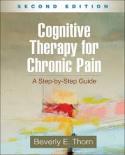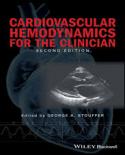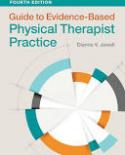February is Black History Month! |
This month we are featuring "Black History Month: A Medical Perspective," our online exhibit containing a chronology of medical achievements of African Americans, a section on folk medicine, and a selective bibliography.
A Conversation with Sarah Cantrell, New Associate Director for Research & Education
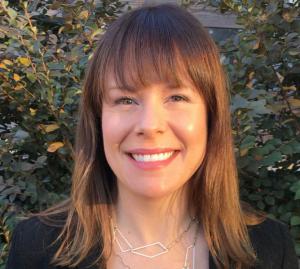
Sarah Cantrell joined the Duke Medical Library & Archives staff on December 1, 2017, bringing a new set of skills to our library — clinical librarianship. In addtion to leading the Research & Education team, she will also serve as a Co-Director of the national Teaching and Leading EBM Workshop beginning in 2019. Sarah comes to us from Walter Reed National Military Medical Center in Bethesda, MD, where she developed and led a clinical librarian program and, among other things, rounded with in-patient teams in Internal Medicine and other units. Prior to that, she was an academic health sciences librarian at Georgetown University Medical Center. With these experiences, she will work to expand our liaison role with Graduate Medical Education (GME) to include more evidence-based medicine teaching and explore avenues for integrating library services more closely at the point-of-care and in other clinically relevant forums.
What is your role here at Duke Medical Center Library & Archives?
I have the privilege of serving as the Associate Director for Research & Education and as the liaison to the Graduate Medical Education programs. I am responsible for planning, developing, implementing, and evaluating the Library's research and education programs, which include instruction, reference, consultations, and systematic review searching. I look forward to leading a team of outstanding and highly motivated medical librarians in their efforts to support research initiatives and improve educational standards among health professionals, students, and faculty across Duke University and Duke Health.
What made you decide to come to Duke?
The people, the reputation, and the opportunities to accomplish great things. I thrive in fast-paced environments that allow me to develop strong relationships with colleagues and constituents through education, outreach, and liaison services. The Medical Center Library & Archives has been a leader in so many areas of health sciences librarianship, particularly in Evidence-Based Practice. I’m extraordinarily excited by the prospect of contributing to and building upon the many successes of my predecessors and the fine contributions of my colleagues!
How do you hope to become actively engaged with GME and the broader Duke Health community?
While the direct paths remain to be seen, I have a number of hopes and dreams coming into this position. At the heart of it, I hope to connect, to partner, and to get involved. Joining key committees and working groups will be a good start, but there is much more to be done! Naturally, I plan to reach out to key stakeholders such as the heads of Graduate Medical Education as well as residency and fellowship program directors across GME. I also want to connect with Chief Residents. Essentially, it is important for me to get a feel for what the constituents love about the Library and our services, and what else they might need or hope to improve. I want to hear from everyone, whether that’s a department head or a brand new intern. I also want to plant ideas for new services and get everyone thinking outside of the box when it comes to libraries and library services. We have so many fantastic existing services and resources, too; I will ensure that these are promoted.
What has been your biggest professional challenge?
I tend to focus on a challenge as an opportunity to grow. In my previous position at Walter Reed National Military Medical Center, I was tasked with establishing and growing a dynamic clinical librarian program with embedded services — including joining daily teaching rounds, conducting point-of-care literature searching, and actively participating in journal clubs. While this was daunting, I found everyone to be highly receptive and encouraging. I spent time getting to know the programs and the specific needs of residents. I love the health sciences and learning about medical topics; so, in an effort to increase my knowledge and prepare for daily rounds, I found myself reading more medical journals, blogs, and resources on understanding things like lab values and diagnostic tools, as well as re-watching all episodes of Grey’s Anatomy. Being present on rounds had a tremendous impact on me, the residents and physicians, as well as the patients. It was extraordinarily meaningful work. Facilitating resident journal clubs also allowed me to deepen my understanding of study designs, statistics, and critical appraisal. Many folks find statistics to be difficult, myself included! So it is a joy when you can promote understanding in this area.
What would you want faculty, staff, and students to know about you?
Librarians love many things, but namely, we really love helping you and partnering with you. Reach out. I am eager to connect with you!
We are Getting New Carpet!
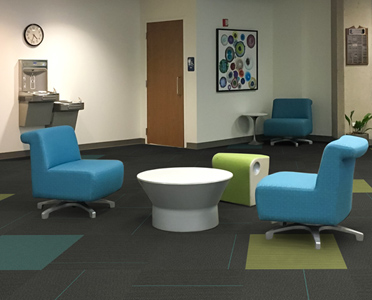 Megan von Isenburg, Associate Dean for Library Services & Archives
Megan von Isenburg, Associate Dean for Library Services & Archives
The Library is replacing the carpet in most areas on Level 1 and Level 2R. Work began January 24th and will take about a month. We are sorry for the mess and any disruption that this causes you!
Here are our tentative plans:
January 24 – February 9: New carpet on Level 2R
This is the hub of the Library and we recognize that the services on this floor are all very important. Our Service Desk will remain the primary point of contact for most of these two weeks. Check in with staff at the Desk for help navigating the Library during the carpet installation.
- Computers will be temporarily relocated to Rm 212E. We will offer free printing in Rm 212E during the project.
- PIN stations will be temporarily relocated to Rm 320 on Level 3.
- Group and individual study rooms on Levels 1 and 3 will remain available.
- Some furniture from Level 2R will be relocated to the Level 1 lobby for temporary use.
- All events scheduled in 212C Conference Rm have been canceled for this period.
February 16 – 20: New carpet on the stairs
We expect minimal disruption while the stairs are being re-carpeted. We will be available to help you find alternate routes around the building.
February 19 – 23: New carpet on Level 1
The Reading Room (Rm 102), the Richmond House Room, and study rooms 102A and 102B will be unavailable for part of the week while carpeting is being installed. Staff will be available to retrieve books form our book collections.
We will update this post with new information as plans evolve. If you have any questions or concerns, please contact Megan von Isenburg.
Honoring Clydie Pugh-Myers and Duke's First LPN Class
Caroline Waller, Medical Center Archives Intern
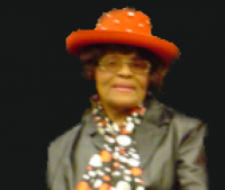 In honor of Black History Month, we are featuring Clydie Pugh-Myers, a graduate of the first class of Duke’s Licensed Practical Nursing (LPN) program in 1949.
In honor of Black History Month, we are featuring Clydie Pugh-Myers, a graduate of the first class of Duke’s Licensed Practical Nursing (LPN) program in 1949.
Duke’s LPN program was established in 1948 as a collaboration of Duke University Hospital, Durham City School, and the North Carolina Department of Vocational Education to train African American nurses. Although 72 women qualified and registered for the program its inaugural year, only 26 would pass the rigorous training and examinations to graduate the following year. The LPN program transferred to the Durham Industrial Education Center, which would later become Durham Technical Community College in the early 1960s.
On January 18, 2006, Jessica Roseberry, former Archives staff member, conducted an oral history interview with Pugh-Myers at her home in Durham, NC. During the interview, she recounted her memories as a young women in the LPN training program and her subsequent career working as a practical nurse in both the public and private sectors. Although she and many of her colleagues were ultimately hired by Duke Hospital, she recalled how Duke initially resisted hiring the new graduates because of their race. The memory of such professional roadblocks stuck with her for the rest of her life. "It was tough," she recalled, "but we hung together.
Pugh-Myers worked at Duke Hospital for two years and then entered the Durham Professional Nurses Registry and began work as a private nurse. She was one of the first African American nurses to work for the registry and served many of Durham's prominent citizens during her long career.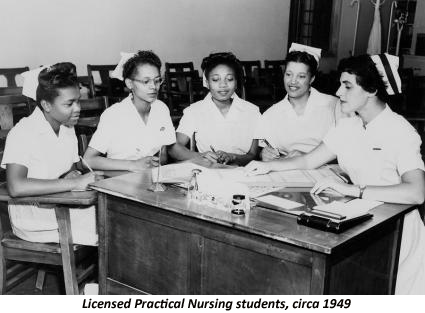 When she began her career, she and other the LPN training program graduates were the first professional African American nurses working in the white ward of the then segregated Duke Hospital, an experience chronicled in her oral history. She provided recollections of various Duke physicians and the impact integration had on healthcare in Durham.
When she began her career, she and other the LPN training program graduates were the first professional African American nurses working in the white ward of the then segregated Duke Hospital, an experience chronicled in her oral history. She provided recollections of various Duke physicians and the impact integration had on healthcare in Durham.
Pugh-Myers looked back on her time serving Duke and the community of Durham fondly, stating that her career as a practical nurse allowed her opportunities to travel and meet all sorts of people, opportunities she otherwise would have never had. She recognized her unique place in the history of African Americans at DUMC and how she and her colleagues blazed the trail for many others. She stated, "when we entered Duke, there wasn’t any professional black help there, nothing but floor workers, dish washers, and the kitchen help, and we were the first. No other technicians were there, so we were really rare. At this day and time, it shows how far that we have came.”
To obtain a copy of the oral history with Clydie Pugh-Myers, please contact the Medical Center Archives. To discover more archival resources related to African Americans at Duke Medicine, visit our subject guide.
EndNote X8 on Mac Now Compatible with Word 2016
 The production version of EndNote X8 has now been updated to be compatible with the new version of Word (Office 2016). If you have EndNote X8, you can update to version X8.2. If you have EndNote X7, you can revert your version of Word 2016 to v15. For more information, connect to EndNote Customer Support.
The production version of EndNote X8 has now been updated to be compatible with the new version of Word (Office 2016). If you have EndNote X8, you can update to version X8.2. If you have EndNote X7, you can revert your version of Word 2016 to v15. For more information, connect to EndNote Customer Support.
Clinical Tools: A Quick Connection to the Evidence
Sarah Cantrell, Associate Director for Research & Education
Seeking quick and reliable answers to your clinical questions? Look no further than the library’s Clinical Tools page! Here you will find a handy list of links to point-of-care resources, decision-support tools, core eBooks, guidelines, and patient education information.
Some of these include:
- DynaMed Plus, which provides evidence-based clinical information concerning diseases, drugs, and other therapies that is highly useful when making decisions about patient care.
- The ability to craft a single search for your patient’s problem/intervention and easily review results from multiple clinical tools including: UpToDate, ACP Journal Club, Cochrane Library, ClinicalKey, Lexicomp, PubMed, & Medline Plus.
- TheNNT, a resource developed by a group of physicians who developed a framework and rating system to evaluate therapies based on their patient-important benefits and harms as well as a system to evaluate diagnostics by patient sign, symptom, lab test or study. Calculating the number needed to treat (NNT) is one way to help you determine the efficacy of certain treatments, particularly if you balance the NNT with an examination of overall treatment harms and costs. Very simply, the NNT is the number of patients to whom you would need to give an intervention to positively affect one. The NNT website allows you to explore the NNT for a variety of medical conditions and treatments. Not only does the site provide the NNT as well as harms or costs, but it also gives you a color-coded summary for a particular treatment.
- Many more point-of-care tools, including the familiar UpToDate and the drug resource Lexicomp.

An excellent complement to our Clinical Tools page is the Mobile Apps guide.
For assistance with any of our resources or for more in-depth help with clinical questions, please contact the Duke Medical Center Librarians via email at medical-librarian@duke.edu!
No Access to Natural Medicines
 Access to Natural Medicines has been suspended temporarily while we negotiate a new contract through the Carolina Corsotium. We will post an update when access is restored.
Access to Natural Medicines has been suspended temporarily while we negotiate a new contract through the Carolina Corsotium. We will post an update when access is restored.
In the meantime, here are a few other available resources that may be useful:
• Lexicomp (Wolters Kluwer Clinical Drug Information)
• About Herbs Search (Memorial Sloan Kettering Cancer Center)
• Herbs at a Glance (National Center for Complementary and Integrative Health)
We apologize for any inconvenience. If you have questions, Ask a Librarian!
New Journal Titles
 Emma Heet, Associate Director, Collection Services
Emma Heet, Associate Director, Collection Services
The following is a list of recent journal subscriptions for 2017-18. Please send any inquires about our journal collections to emma.cryer@duke.edu.
Historical Materials about African Americans at Duke Medicine
Rebecca Williams, Archives Librarian for Research, Outreach, and Education
This issue highlights the research guide, African American History at Duke Medicine, produced by Medical Center Archives. The guide aims to introduce researchers to materials documenting the history of African American faculty, students, and staff at Duke Medicine. Included are oral histories, archival collections, photographs, audiovisual materials, and publications, selected key dates and key figures, and links to recommended digital resources.
 |
Featured New E-Books
Barbara Dietsch, Electronic Resources & Acquisitions Manager, Collection Services
Here are a few of our newly-acquired e-books. Reviews are excerpted from Amazon.com.
Beverly E. Thorn
Now revised and significantly expanded, this go-to manual has enabled thousands of clinicians to effectively treat clients with chronic pain. In the face of today's growing opioid crisis, pain self-management techniques are needed now more than ever.
George A. Stouffer
This 2nd edition provides a useful, succinct and understandable guide to the practical application of hemodynamics in clinical medicine for all trainees and clinicians in the field.
Dianne V. Jewell
This evidence-based practice text explains the fundamentals of medical research and how to determine which studies are useful in the practice of physical therapy.
Suggestions for purchases? Complete our online Recommend a Purchase form or contact Emma Cryer Heet. For a complete list of titles added to our print book collections within the last 3 months, check out the Library's newest print book additions or subscribe to our "New Books" feed.
Staff News
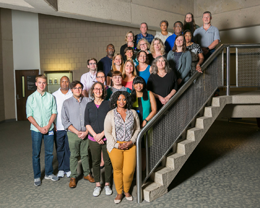
Jamie Conklin, Research & Education Librarian and Liaison to the School of Nursing, has coauthored the following two articles:
Margaret A. Bush, Sharron Rushton, Jamie L. Conklin, Marilyn H. Oermann, "Considerations for Developing a Student Evaluation of Teaching Form," Teaching and Learning in Nursing (in press).
Jennie C. De Gagne, Jamie L. Conklin, Sandra S. Yamane, Hee Sun Kang, Myung-Sun Hyun, "Educating Future Health Care Professionals about Cybercivility: Needs Assessment Study," Nurse Educator, December, 2017.
Russell Koonts, Director of Medical Archives and Digital Initiatives, has been accepted as an Association of American Medical Colleges (AAMC) LEAD Fellow. This national program provides professional development and mentorship in transformational leadership.
Leila Ledbetter, Research & Education Librarian and Liaison to the Doctor of Physical Therapy Program, has coauthored the following article: Y. Tousignant-Laflamme, S. Christopher, D. Clewley, L. Ledbetter, C.J. Cook, C.E. Cook, "Does Shared Decision Making Results in Better Health Related Outcomes for Individuals With Painful Musculoskeletal Disorders? A Systematic Review," Journal of Manual and Manipulative Therapy, 25(3):144-150, 2017.
Improve Your Library Research Skills!
The Medical Center Library offers training on a variety of topics. Request a session for yourself or a group, schedule an appointment for a research consultation, or register for a class.
Publication Schedule & Staff
Duke University Medical Center Library & Archives News is published bimonthly.
| Megan von Isenburg, Associate Dean | Beverly Murphy, Editor |
| Editorial Board: | |
| Elizabeth Berney | Jamie Conklin |
| Barbara Dietsch | Rebecca Williams |
Subscribe to our newsletter and be notified when a new issue is published!

